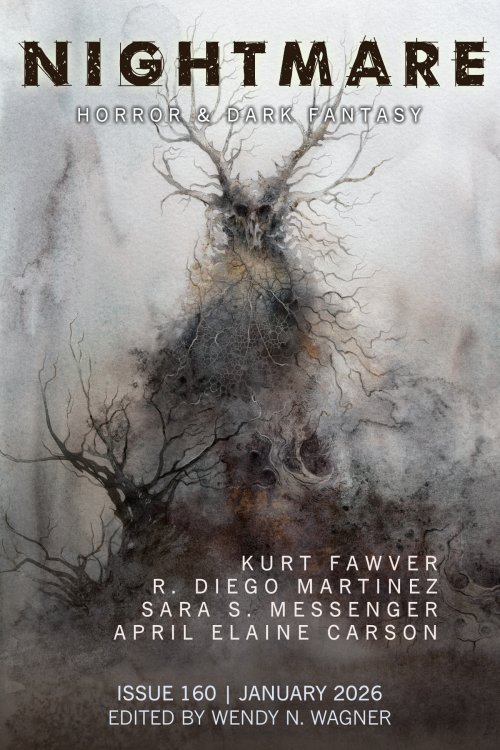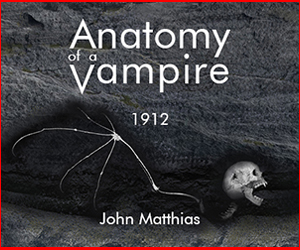Important Note About Kindle Periodicals/Unlimited Subscriptions
Nightmare is withdrawing from the Kindle Periodicals Program on Kindle Unlimited due to the draconian terms and conditions. If you’re a subscriber via Kindle Unlimited and wish to continue your subscription (and we really hope you will!), you can subscribe directly via our website or via Weightless Books; all subscription options are available at nightmaremagazine.com/support. Each issue can still be sent to your Kindle device or app automatically. Your support during this transition (and going forward) is more important now than ever, so please do select one of the other subscription options. Thanks for your patronage!
CW: self-harm, blood.
The doctors do not understand the reasons for the graft failure. I think it happened because I was sick and depressed and could not stop hurting myself.
The sickness was not a new development. I had felt its weight for all my life but only at the university did it become overwhelming—I would spend hours wandering campus, talking to myself, huddled in coats and sweating despite the frigid night air. The other students would scoff and ignore me or else they’d give me dirty looks like I disgusted them, as if they saw my face all full of boils and sores. A leper, that’s how they saw me, a leper, but I assure you I was no leper. My face was smooth and beautiful, though at the time I did hate it. I was a pretty man, then. Now I am older and my hair is receding and I have many more scars and I am not so pretty anymore, though it makes little difference to me.
My first weeks, I thought perhaps I had some secret blemish which caused the other people at the college to grimace at me on the street and in the cafés, to refuse my eyes or sometimes even to shove me or knock things from my hands and then apologize with mockery, as if we were children on the schoolyard. It took time to realize that it was not physical disdain or even any personal grievance they had with my character but with the air around me, my particular miasma. They all hated me, not because I was ugly but because they saw something inside me worth hating. They feared they might catch my self-deprecation like an illness. Which is justified, I think. Bad moods have a habit of spreading and my complication of feeling was worse than any mood, more foul and more stagnant.
No, I was not sick or depressed in a petty way. I was a rotten seed, and I have hated everything about myself from the moment I was born. I anguished over the words I spoke or did not speak. I was disgusted with the fat distribution of my torso and the lack of visible musculature in my arms and neck. I hated everyone around me who seemed to have succeeded in ways that I could not, who seemed happy or self-contented, who had a family, who made a decent living.
Here is my psychology: an endless ouroboros of self-hatred toward envy toward hatred toward shame toward self-hatred, mouth swallowing tail, envy shame hatred shame and on, on, on—I hate myself endlessly for endless reasons and there is no cause or origin except to say that I was born like this, a rotten seed. It has always been there and will always be there. Even now I return to it. Even now, without a self to hate, I hate myself.
I have always hurt myself in subtle ways, but it was the long freezing hours of my campus walks that led to hurting myself more severely. Everyone, I think, will hurt themselves once in their life. A razor or a bout of too much drink. But these people are not true sufferers as I am; such depravity, when I can look at them and diagnose them with the common cold. In comparison to them, I am cancerous, terminal, and my self-abuses over time have become more refined, more pathetic and depraved.
This is why I ate glass and struck my fingers with the hammer. Not content with petty self-effacement, I had the urge to hurt myself in ways no man had ever felt before, save for Shakespeare’s Portia or the deranged self-hating Oedipus. I shattered a glass cup with a hammer and ate the shards. Then I took the hammer and brought it down on each finger in my right hand, and then I crushed the fingers of my left in a cabinet door.
I was not completely lucid. I had compulsions, have always had compulsions, often very strong. A little voice in my head tells me to do horrible things to myself. Slam my forehead into mirrors. Jam pencils in my eyes. But in the isolation of the university air, the magnitude of my suffering was truly equivalent to the feeling of hard lumpen steel smashing flat my hand, equivalent to the subtly electric sting of glass shards tickling at my tongue and cutting criss-cross lines in my esophagus. I could not fight the urges anymore. I wanted it. I wanted to feel it. It was revenge, I think. Against myself for obvious reasons and against others for deducing them.
No, it was not reasonable, and no, it was not safe or intelligent of me to do this. I’m aware. The pain was unbearable, and as I walked into the lecture hall, a thousand students tried to call the police and the hospital and a woman’s voice shrieked: His throat is bleeding, God, it’s bleeding from the inside.
I did not care then and, really, I care very little now. I would not recommend the experience of eating glass, but I will say, even with all that has happened and the complete and total loss of the body which I punished so harshly over so many years, that I did enjoy the pain a certain amount. I felt nothing except for a dull joy, even at the screams of my classmates as they saw me, an unnameable horror with fingers crooked and black and blood leaking from its mouth, a joy antithetical to the suffering and the sickness, but a joy nonetheless. They finally saw me not as a disgusting leper worthy only of pity and disdain but as a genuine sufferer, the victim of a kind of psychic violence which had caused me to do these things to myself, and yes, they screamed and were frightened, but they paid me much attention and tried very hard to get me help, and it felt good to hear that they cared so much for me, a sick stranger who they had only ever met before with a hidden nausea on their lips—now they cared because my pain was evident in a way they could understand and I felt satisfaction.
It was then in the lecture hall that I threw up my brain.
• • • •
It was very near to vomiting. Not the stomach which cinched and churned but the skull, then hot acid bile in my throat. A migraine thrumming, a belt pulled taut around the waist of my cerebellum. The soft lump of gray matter descending like a slug from my neurocranium into my mouth. The revolting taste of it, revolting texture, consciousness slipping from me in a stream of viscera, sliding onto the linoleum floor. My vision turned black and my limbs numb. I thought surely I had died.
It was a very long time before anyone could tell me what had happened. Time slipped endless black and I believed I was in Hell—Hell my own thoughts, Hell nothing but my own thoughts. I have no concept of the time it took for the doctors to contact me. Eons, I think. Every instant might have been a year and an hour to me is unfathomable. I hear no ticking clocks or cuckoo chimes, I do not feel cool night air or hot summer sun. I lack the organs for any of that, now.
Graft failure secondary to hyperacute rejection. Really, it should have killed me. Immunorejection of the brain has occurred before, primarily in experimental head transplants performed on rhesus monkeys, but it has always resulted in failure of the organ and immediate brain death. Never has it resulted in anything resembling my situation. This is new. The doctors call it a miracle, the first of its kind. There’s talk of naming the condition after me. My name cemented in the annals of medical history. My pathetic neurosis immortalized. I want to fight them, but speaking takes such time. Each word such effort. I cannot find the strength to protest against such nothingness.
The doctors communicate with me by attaching current-receiving nodes to the language- and image-processing centers of my occipital and temporal lobes. I cannot explain it further as the science is very complicated and I understand very little, only what the doctors are able to relay through the wires, and they themselves lose patience with the slow pace and minute technical fiddling required to send me long messages.
On receiving, individual letters seem to light up neon-bright in my mind and sometimes they even send me pictures. Feeding polaroids into my thoughts, like faxes. Faces smearing and turning unclear in the transition from physical photo to nebulous electric impulse, and lights becoming blurry with astigmatic halos.
I hate it. I hate it all. They transmit photos of the doctors, of the visitors I sometimes receive in the hospital where they keep me, as if these things would bring me comfort and not an inexpressible horror that this divorce from life and body is true and not the final death-throes of a suffering, psychotic mind as I wish it would turn out to be.
The only positive experience in all my time in the hospital was eons ago, when a young woman from the university came to visit. She was not a PhD student at the medical school or an undergraduate psychologist, the kinds of visitors I was accustomed to receiving, but a woman my age who had been there in the lecture hall when I came stumbling in all bloody and sick and who I suppose must have been scared very badly.
The neurosurgeons were experimenting then with a system of electrical impulses designed to stimulate memories of physical sensation. Presumably for no reason other than my own comfort, allowing me to feel touch at the discretion of my visitors. Buttons lined up on a console, an interactive display at a children’s museum. Hold Hand. Kiss Cheek. Hug. The intended impulses were often incorrect and would instead evoke memories of breastfeeding or masturbation but again it seemed to me such nothingness.
Hello, the woman said, each letter forming from the darkness, molding the black like clay into words. Do you remember me?
The doctors had told me her name, but I do not remember it now. I did not remember it then. No, I told her through the wires. But they tell me you were there.
I was, she said. You poor thing. I think about you all the time. Your horrible moans. Everyone screaming, shrieking, all that blood. I was the one who noticed it was coming out of your neck like that. God, you were in so much pain. Does it still hurt?
Yes, I said.
You scared me very badly. I think about you all the time.
You’ve said that.
Yes, it’s just that I dream about it constantly. Nightmares, I have these nightmares almost every night where I try to get you help but you’re already pooling on the floor. Your broken body is already standing over you, convulsing, howling like a cat.
Why have you come? Just to remind me of my sickness?
Well, I thought maybe I could help you in some way. Ease your pain however I can. I was thinking it might help me stop dreaming so much.
You can’t help. I’m still nothing but a rotten seed.
A long pause, then. A weight inside me caused by her silence. And then, spoken so slowly, the letters taking so long to form I almost forget the words as I’m reading them:
I’m sorry, she says. You poor, poor thing.
And then she held my hand. A falsity—an electrical imitation. I will remember it forever.
The warmth, her warmth. As if I’d stepped inside from that frigid university air for the first time. She set fire to my nerves. I felt human, not sick or deranged or stagnant but overflowing with life, with feeling, and I begged her to press the button again. I told her to hold my hand again and keep it there, not a fleeting touch but an act of prolonged care and she obliged and pressed the other buttons also, to hug me and to kiss me and to hold my hand and hold my hand and hold my hand, and God for a moment I felt no different than anyone else. I was alive.
Come back again, I told her through the wires. Please come back again.
After she had left, the doctors fed me a Polaroid. Her sitting on a plastic stool. My disembodied brain floating beside her in a jar of nutrient solution. I did not recognize her in the slightest. The distortion from the transfer had turned her face into a nest of serpents.
She never did come back. And more eons pass in this fleshlessness.
I am not sure if it has been one year since the miracle or one million. The doctors have begun to peter out, I think. Their visits shorter. Their sentences clipped and often doing away with grammar: How feel? and Comfort one ten? and things of that nature.
Everything hurts. Writing this small memoir has taken such energy and such time and no one on Earth will read it or care and I must be content with that.
Most recently, a doctor fed me a Polaroid of my own body. He told me the police have been attempting to track it down for a long while so they can attempt a reimplantation, but the body has been avoiding them, fueled by some alternative intelligence, pushing into the bowels of the university. Living inside the walls of dormitory buildings and digging burrows in green campus hillsides. In the photo, I am naked. Sitting hunched over an upturned trash can, eating garbage. Feral and mangy. My hairline recedes. My face and chest are covered in cuts and scars I did not have before. I am much older than I remember.
It is disheartening to see my eyes so wide with life, with energy. This body has no predator. No torturer. No one to feed it glass or smash its fingers with a hammer. When I controlled this body, it did nothing but suffer.
Seeing it again, I was able to imagine it retracing our steps along the freezing walkways where I once contemplated suicide—but now it is walking in springtime. Eating from the garbage and evading the police with a veracity of life that I cannot imagine myself ever achieving. The closest I’ve ever come was my visit with the faceless woman. Her touch, her touch, her touch. The ecstasy of her touch. Or, perhaps that day in the lecture hall. Infinite eyes upon me. All of them holding me, tugging at me, asking what I’d done to myself, trying to help me. Yes, I am moaning and bleeding and they are shrieking with terror but they care so much they care so much and I am at their center. For a moment I could pretend they loved me in spite of my sickness.
Now, my miasma is contained in this little jar. Watched over by doctors and researchers. Swept behind a quarantine zone. And I can remember when a stranger called me Poor, Poor Thing. Or the moment when my classmates shook me and looked in my eyes and wanted me to live. Falsities, electrical imitations—but these memories are better than what I had before.
And my body, feral and simple, can run and hide and trace happy footpaths in the spring. Alive now, really alive, without me.









